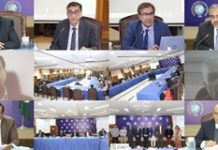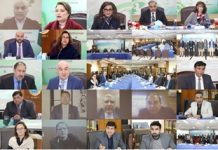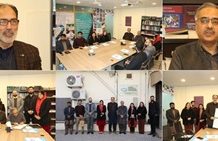Press Release
Webinar on
“Cyber Technologies and Responsible State Behaviour: Achieving Peace, Security and Sustainable Development”
June 29, 2021

The Arms Control and Disarmament Center (ACDC) at the Institute of Strategic Studies Islamabad organised a webinar on “Cyber Technologies and Responsible State Behaviour: Achieving Peace, Security and Sustainable Development” on June 29, 2021. The eminent speakers included Brig. Mohammad Yasin, Senior Advisor SDPI, Dr. Tughral Yamin, Associate Dean CIPS, NUST and Dr. Khashif Kifayat, Dean Computer Sciences, Air University Islamabad.
Malik Qasim Mustafa, Director ACDC-ISSI, in his introductory remarks said that the use of cyber technologies has transformed our lives and providing us with endless possibilities to transform our future. The world is already witnessing a growing competition between major players to dominate each other in cyberspace. There is a likelihood that the growing use of cyber technologies is going to affect individuals and states and peace, security and development. In this regard, states should ensure the protection of cyberspace from cyber threats and cyberwarfare to safeguard their social, economic and national security interests.
Ambassador Aizaz Ahmad Chaudhry, Director General ISSI, in his welcome remarks said cyber technologies are changing the way humans lead their life. Its use can be positive or negative. It is the malicious use that is of concern. There is a need to regulate it at the regional and global levels. It is important to generate debate on responsible state behaviour in the cyber realm.
Ms. Aamna Rafiq, Research Associate ACDC-ISSI, in her briefing said it is critical to identify new ways to unlock the full potential of cyber technologies for human development. These developments could be an essential building block in the ability to achieve the Global Goals in 2030. She said that it is essential to establish an international regime to regulate cyberspace and promote responsible state behaviour.
Brig. Mohammad Yasin, while speaking on “Cybersecurity for Sustainable Development” said that there has been a rapid increase in cyber-attacks globally over the last few years. There is a deep relation between cybersecurity and growth and development. Pakistan has many challenges in the realm of cybersecurity. He said that Pakistan’s cybersecurity approach is weak, disorganised, and superficial. Public and private organisations are working in isolation. There is no coordination between the armed forces of the country. He emphasised the need to work to secure the country’s infrastructure. Pakistan now has a cybersecurity regulation. All stakeholders must work together to devise best practices. He stressed that there can be no sustainable development without cybersecurity.
Dr. Tughral Yamin spoke on “Building a Cyberspace Regime for Security and Peace: A Regional Approach.” He said the cyberspace regime should be part of the overarching national security architecture. He suggested that it should have joint ownership of all the stakeholders including the military-civil sector and corporate sector. It should cover all legal aspects but should not be at the cost of the citizens’ digital rights. He said it should be adopted with consensus through the parliament. He said that cybersecurity should be on top of the national and global agenda. He said that a regional approach is possible through the South Asian Association for Regional Cooperation (SAARC) or Shangai Cooperation Organisation (SCO). The SCO is a better forum because it is not hostage to India Pakistan rivalry.
Dr. Khashif Kifayat, in his remarks on “International Cooperation for Peaceful Uses of Cyber Technologies: A Case for Pakistan,” said that in today’s world cyberspace is increasingly important because our dependence is increasing. He talked about the human factor in cybersecurity. He especially talked about online child exploitation that is hitting the entire world very hard. He said that this could be a common ground for international cooperation. Another area where global cooperation could be very fruitful is the banking sector. This is a sector where we can collaborate internationally to stop cyber crimes which cause financial losses. He emphasised the need to develop human resources in Pakistan to tackle the problem of cybersecurity.
The webinar was followed by an interesting question and answer session. In his concluding remarks, Amb. Khalid Mahmood, Chairman BOG ISSI, said that cyber technologies could help accelerate the achievement of the UN’s Sustainable Development Goals (SDGs). They are also helping in peacekeeping efforts and better governance. There are great benefits to cyber technologies but it has its costs. These techs can be misused to launch like cyberattacks. These threats are increasing in sophistication and inflicting major financial losses to countries corporations and individuals. He pointed that access to cyberspace and its misuse by non-state actors is a source of concern and can create havoc. As cyber technologies keep evolving, so there is a need to promote measures to promote responsible behaviour in the form of a legal framework, awareness, and skill development.












